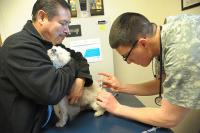What are Vaccines
Vaccines are products that contain bacteria or viruses. They are given to protect a pet from the diseases caused by those organisms. The bacteria or virus has a protein on the outside that is unique to it. This is called an antigen.
When the body sees that antigen it knows it is foreign material and shouldn’t be there. The body then produces antibodies. The antibodies attach to the antigens. The antibodies either neutralize the antigen or take it to certain white blood cells that destroy it. Either way, the bacteria or virus doesn’t cause your pet to get sick.
Forms of Vaccines
Vaccines are weak or killed forms of the bacteria or virus. They are too weak to cause diseases. However, they provide the antigen so your pet’s body knows what kind of antibodies to make. There are three different types of vaccines: Modified Live Vaccines, Killed Vaccines, and Recombinant Vaccines. They work a little differently but all will protect your pet under most circumstances.
Reasons Why Vaccines Fail
No vaccine is 100% effective. None will protect every pet every time. There are many reasons why this can happen, including improper vaccine schedules, mutations, system overload, and many many more. The most common reason, though, is due to the immune system of the pet. A healthy immune response is needed for your pet’s body to make antibodies. For this reason, sick pets should not be vaccinated.
Your pet may also encounter a very large amount of the bacteria or virus. In some cases, your pet’s immune system will get overwhelmed and can’t make enough antibodies. He will then get sick. It is also important to be aware that the bacteria or virus can also mutate. That means it changes into a slightly different form. The body may not realize it’s the same one and doesn’t make antibodies against it.
Puppies and kittens receive antibodies from their mothers. These antibodies protect the youngster for the first weeks of his life. Without their mom, a very strict vaccine schedule needs to be followed to “load” the youngster’s immune system and create the desired immune response for future exposure. If this isn’t done properly, future vaccinations throughout adulthood can be ineffective.
Side Effects and Reactions
Vaccines have improved over the years, and we don’t see as many reactions as we used to. Fortunately, most pets don’t have any problems when given a vaccination. Side effects or allergic reactions are always possible, though. They don’t always happen the first time a vaccine is given either.
Common side effects are lethargy, pain and a reduced appetite. These will usually happen within the first day or two after the vaccine is given.
Some pets will develop a small lump where the injection was given. Although in cats that lump can become cancer, we haven’t seen that in dogs. The lump should go away after a couple months. If it occurs in your cat, see your veterinarian.
Some more serious signs include vomiting, diarrhea, seizures, difficulty breathing, or swelling of the face and ears. All of these should prompt a call to your vet, but most commonly will occur within the first few hours of the vaccine being given.
Blood Titers
You can have titers checked of your pet’s blood that measure the amount of antibody to a disease. Titers are usually done for distemper and parvo in dogs and panleukopenia (distemper) in cats. If the titer is good, your pet doesn’t need another vaccination. It won’t improve your pet’s protection.
Summary
This is some basic information about vaccines. Read our articles on Vaccinations for Dogs and Vaccinations for Cats for specific recommendations.
All articles are reviewed and maintained by whiskerDocs team of veterinary experts.



